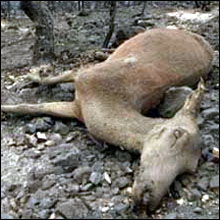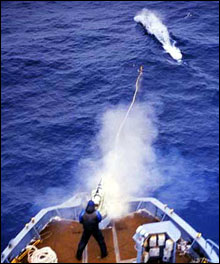UN climate talks agree blueprint for action
|
A United Nations climate conference agreed on a blueprint for fighting
global warming and said governments have only a few years to avert some
of the worst impacts.
Delegates at the 130-nation talks stood and applauded after chairperson Rajendra Pachauri brought down the gavel on the November 12 to 17 meeting in Valencia, Spain, that wraps up six years of work on the most authoritative review of climate science.
Government delegates and scientists agreed a summary of about 20 pages late on Friday about the mounting risk of climate change -- ranging from extinctions to rising sea levels -- and condensing 3 000 pages of science published earlier this year.
"This is the strongest report yet by the IPCC (Intergovernmental Panel on Climate Change) but says that there is still time to act," said Bill Hare, a climate scientist who was among the authors.
The document will put pressure on environment ministers who will meet next month in Bali, Indonesia, to do more to combat warming. Many countries hope that Bali will agree a two-year roadmap to negotiate a successor to the Kyoto Protocol, the main UN plan for fighting warming until 2012.
"The report sends a very strong signal to Bali," said Hans Verolme, director of the WWF conservation group's climate change programme. "Now it's up to the politicians."
Kyoto only sets binding goals for cutting greenhouse gases for 36 industrial nations. The United States and developing nations led by China, the two main emitters of greenhouse gases, are outside Kyoto.
Threshold for "dangerous" changes
The IPCC report will be formally presented on Saturday by United Nations Secretary General Ban Ki-moon in Valencia.
The summary says human activity is "very likely" to be the cause of rising temperatures and that deep cuts in greenhouse gas emissions, mainly from burning fossil fuels, are needed to avert ever more heatwaves, melting glaciers, extinctions and rising sea levels.
Under the toughest scenario considered by the IPCC, greenhouse gases would have to peak by 2015 to limit global temperature rises to 2°C to 2,4°C over pre-industrial times.
The European Union says 2°C will be a threshold for "dangerous" changes, and even with temperature rises of below 2°C, the IPCC projects more wildfires, more deaths from heatwaves, floods and droughts and more malnutrition in Africa.
The report says human activities could lead to "abrupt or irreversible" climate changes and impacts, such as extinctions of species.
Delegates from the environmental movement appeared happy the synthesis had not watered down the message from the scientists. "I think the report is somewhat stronger than many people feared," one delegate said.
Kyoto now obliges 36 industrial nations to cut emissions by at least 5% below 1990 levels by 2008/2012.
The IPCC has drawn much more attention since it became the joint winner of the 2007 Nobel Peace Prize with former US vice-president Al Gore. This has meant that governments are watching and shaping its conclusions with even more care.
Source: Reuters












